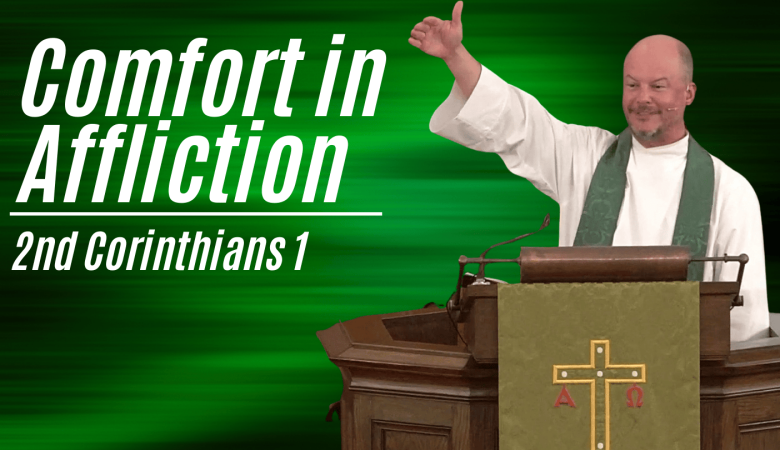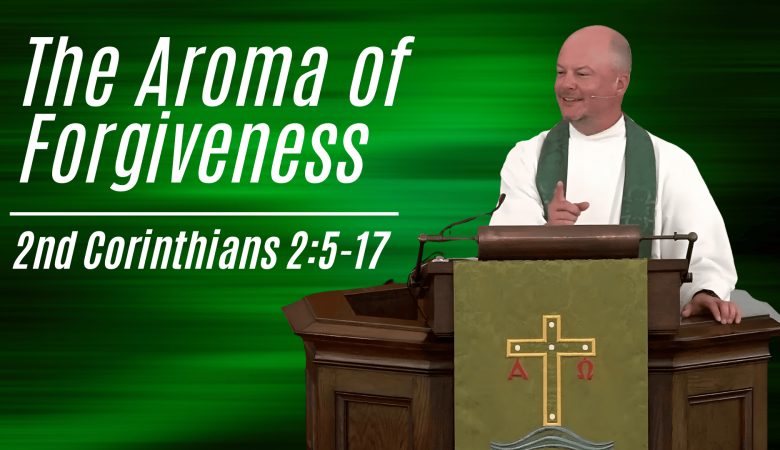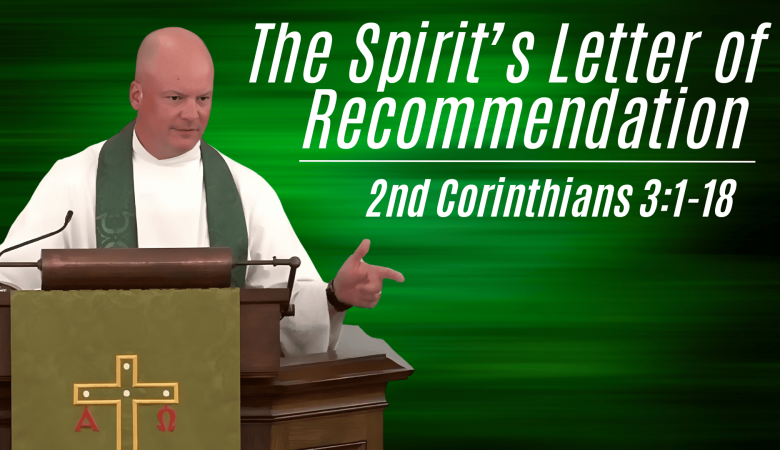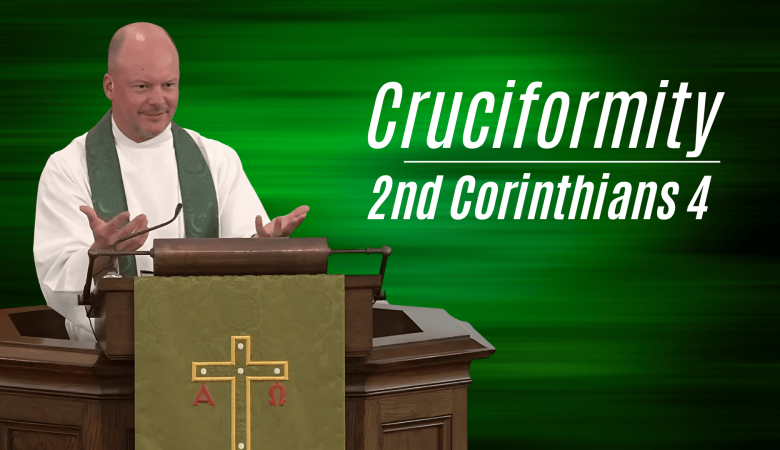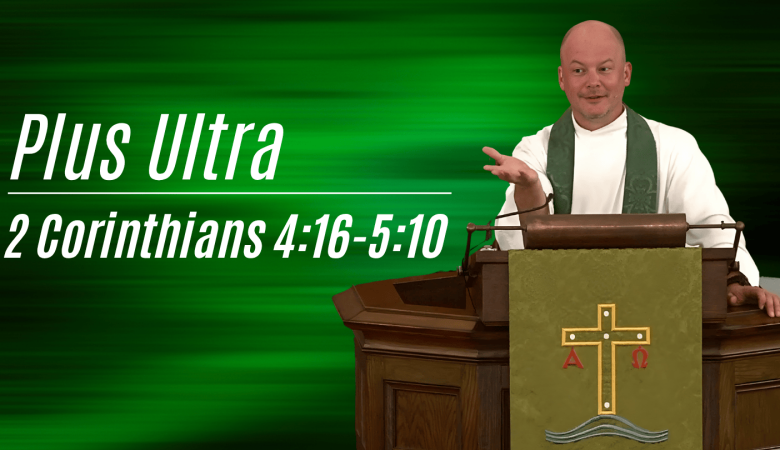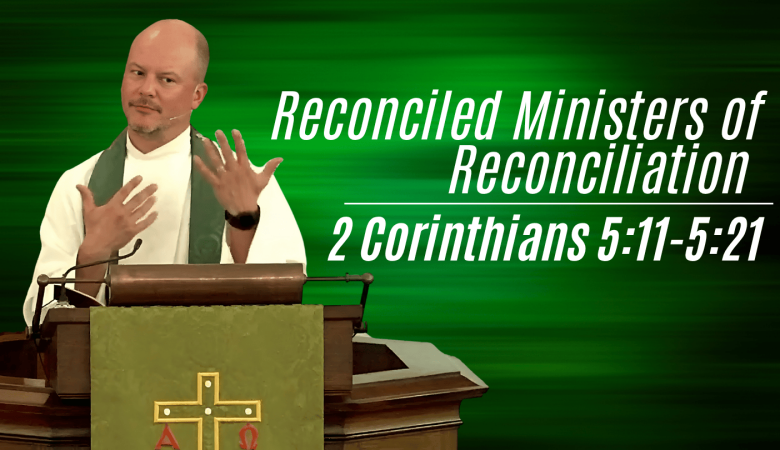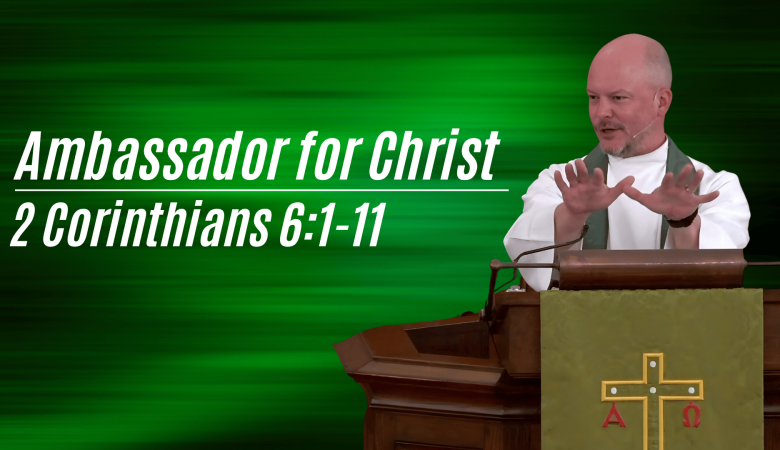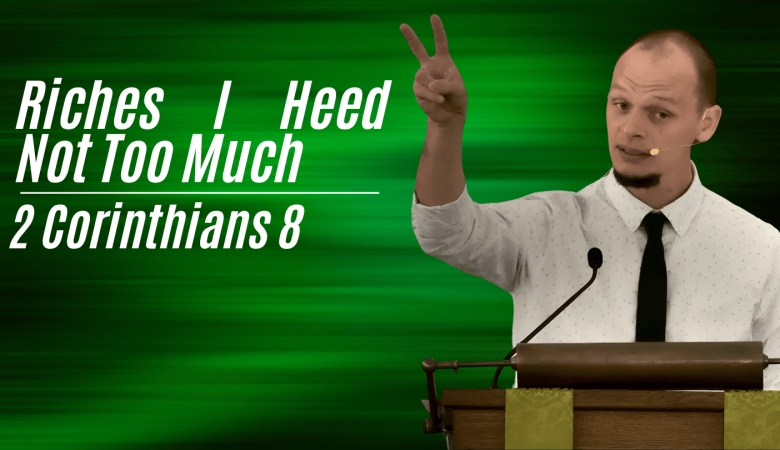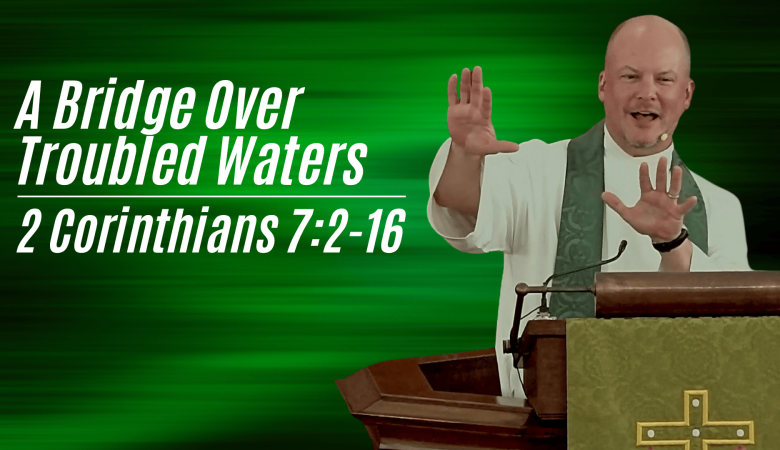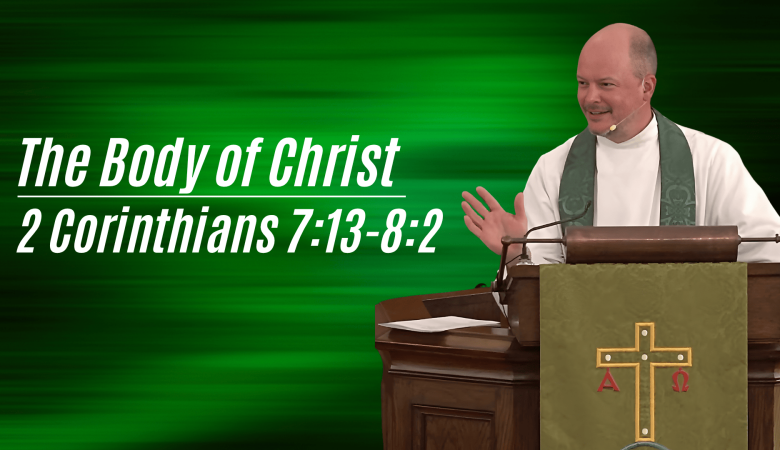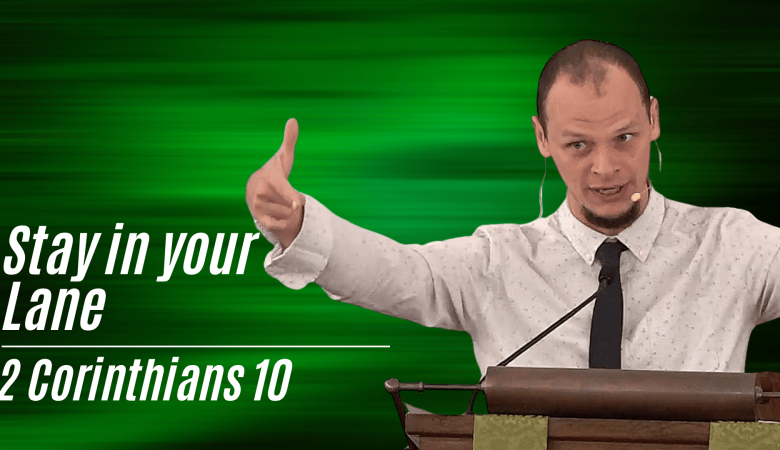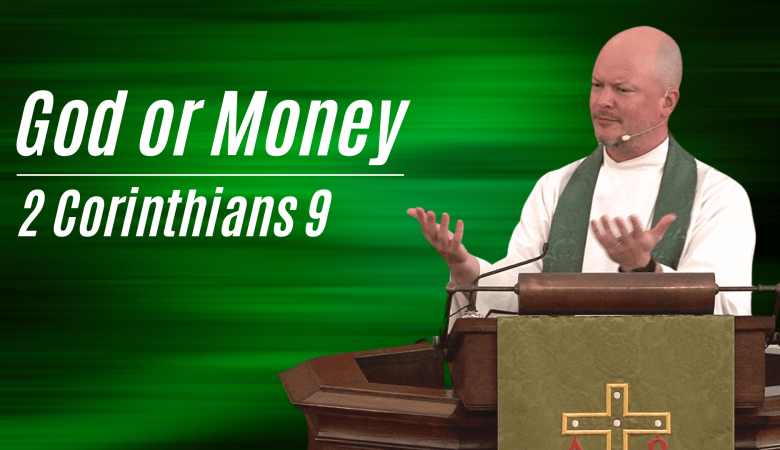Series: Power in Weakness
Unequally Yoked
October 19, 2025 | Peter Rowan
Passage: 2 Corinthians 6:14-7:1
Summary
You are who you listen to. Voices and influences from our surroundings shape us more quickly and powerfully than we often realize. Social media accounts, entertainment choices, friends, and cultural pressures all compete to form our identity and values. The Christians in Corinth faced similar pressures—they walked streets lined with temples, conducted business in rooms where people sacrificed food to idols, and constantly encountered competing worldviews – and Paul warned them to keep themselves from being unequally yoked to these worldviews.
Transcript
Lord in heaven, pray that we would have a posture towards you that is one that desires you to speak into our lives, that you would speak the foundational words into our lives, that we would find our life hidden with Christ and God. God, speak now. We desire to be taught by you, Lord. I pray that so many of the words and thoughts that cloud our minds constantly, maybe just thinking about the concerns of our coming week or the joys of our past week, or what games might be on today or whatever, would go to the wayside that we would hear your voice this morning. Now may the words of my mouth and the meditations of our hearts be pleasing in your sight, O Lord, our rock and our redeemer. Amen.
All right, let me address the elephant in the room. Some of you are wondering why this soup strainer is above my lips. This crumb catcher right here. So let me talk about it for a second. You want an explanation? I'll give you an explanation. Okay. So whenever I have been shaving recently, I have these three little people that reside in my house. And these three little people have been begging me and, you know, coming to me, I'll shave your mustache, dad. And I have been strong, resisted such foolish talk, been successful in my resolve, but they won the battle. Until this week, I was strong. Their voices, their cute little faces, pleading won me over.
And part of it was that these past few weeks, we have given some of our attention to the Seattle Mariners. Amen. Amen. Thank you for wearing that shirt, Will, because the Mariners have made it to the postseason. This. They are currently in the American League Championship Series. They haven't been for 24 years. The Mariners have been a franchise for 48 years. They've never made it to the World Series. They're the only team that has never made it to the World Series. And if they win tonight, y' all know this. I'm not hearing any cheers. I can see Will smile. Henry knows what's. They're going to make it to the World Series. Woo hoo.
So anyway, anyway, I saw all these baseball players. We watched more baseball than normal, and a lot of them have mustaches. And I'm like, well, maybe that is cool. Maybe I need to heed the voices of these three little people. So I, the other night, left my mustache. And then we were at Lily's volleyball game on Friday and we saw some friends and they said, oh, man, your kids were encouraging my husband to not shave his mustache. And they were saying, quote, Mr. Rowan has a sick stache, dad. But then I should let you know that as soon as I emerged from the bathroom with said stache, the most important human voice in my life spoke to me, saying, when are you going to shave that?
Okay, so a few things are happening here. I listened to the pressure of those around me, the cute little voices. I felt the pressure, the social pressure of my surroundings. The media I was consuming became a louder voice than it had ever been. Go Mariners. And isn't it amazing how quickly. I mean, just very. This is a silly example, but it is amazing how quickly we can pick up on that which surrounds us and have our life shaped out of that. It's incredible how it happens. It's amazing how our surroundings can so influence us that we can forget who we are.
You and I both know probably the truth of that famous quote that's attributed to the motivational speaker Jim Rohn. You are the average of the five people you spend most of your time with. It could be modified, of course. Let's admit it today, these people don't have to be people that, you know. They can be a baseball team that you grew up following. Maybe it should be. You are the average of the top five social media accounts that you consume. I have no doubt that most of us sort of discount probably to our harm how influential the media consume that we consume is. We think, I'm an independent person. I do, me. But we all know how much of how we live is just simply the reality of what we've taken in, the voices that are loud in our ears, how we've learned to think and how we've learned to talk and how we have learned to feel and behave. And all the rest is so often formed by what we listen to and what we watch and our TVs and our computers and most of all, that box that just is persistently in our pockets.
We're not much different than the Corinthians. Sure, they were not carrying around all the tech that we do, but they had friends and they had business partners, and they. They walked streets that were lined with temples and businesses called to their attention. I actually, if. If you were in a business with another person, it was mo. It was very common that your business dealings would be actually done in the rooms of the temples that were reserved for eating the food that had been sacrificed to idols. You were called to live a certain kind of way here.
In our text this morning, Paul's telling us that there is a fundamental voice in our life. And that fundamental voice, that fundamental reality is what has to give shape to all others. And he's speaking to the fact that we are so often pulled into these other things, this other dynamic that shapes us, saying that there's a more fundamental reality, there's a more fundamental relationship than these others, and they inform the others, they shape the others. Because of this, we who have found our life and put our trust in Jesus, we are called to live actually as a distinct people living in distinct lives a lot of ways from those about a separate holy lives.
Here is the truth, okay? In the Bible, we are called to live in the world. We are called to live for the world, for the life of the world. And yet we're called to live distinct from the world about us as the people of God, as people who have found their life hidden with Christ in God. What this text is telling us is that we are actually to not pursue unholy unions and to find our life in the holy union. Okay, so that's kind of my two points. The unholy unions and the holy union.
So here's how our passage begins this morning. You open up second Corinthians, chapter six, starting in verse 14, just the first sentence there. Do not be unequally yoked with unbelievers, means those not of the faith. That's literally what it means. Not faith. That's the word unbelievers, not of the faith. Interestingly, the words that we. The word that we have, or the words together that we have unequally yoked. That's one word in Greek. It's just the word heterozygontes. And that does mean, you know, two coming together. But some translate it pull the yoke in the opposite direction, which makes a ton of sense. Why would you actually be connected, yoked together with ones that are going in the opposite direction, pulling in different directions?
So you all know probably the image of a yoke, it's a farming instrument. It's a farming tool that's placed over different animals to enable those animals to pull something together, to work together towards a certain end. This command actually comes from the Old Testament. There's a passage in the book of deuteronomy in chapter 22, verse 10, says, you shall not plow with an ox and a donkey together. And it's kind of interesting. This has kind of two big reasons. One's theological and one's practical. The ox was a clean animal. The donkey was an unclean animal in the Old Testament law. And so partly what's taking place is this prohibition of this unequally yoked dynamic in Deuteronomy was to be a Reminder the people of God of how it just the clean and the unclean, they're not supposed to go together in this way. There's a theological reminder that's taking place.
The people had bound themselves to God and you can't then bind yourself to that which is not of God. They found their fundamental relationship with the One who had saved them. How can they then be united in such a way with those who don't follow that God? So there's this theological dynamic at play, but there's also very much this practical dynamic. If you just think with me about the ox and the donkey, does that work very well? I mean, donkeys are known as stubborn animals. Ox are known as very strong, hard working animals. That's not going to be a union. That is actually just practically very helpful. See this theological. And you have this practical dynamic that's at play there.
The yoke was an imagery act in agrarian society that was of course, very, very familiar to the people of that society. And I think it's this reason actually why this yoke image is brought up quite a bit in the Bible, actually. So Israel, when they're said to be in slavery in Egypt, were under the yoke of Pharaoh. There was a theological thing that was going on. There's a practical thing that's taking place there when they're freed from Egypt. Actually there's three different passages in the Old Testament when the people of God go back and they worship baal, particularly BAAL of Peor, and they're told to be under the yoke three times. They're said to be under the yoke when they're worshiping a different God. There's a theological dynamic that's at play, but it's also a practical dynamic that's at play.
The prophet Jeremiah talked about how God broke the yoke of slavery. He broke the yoke. The people were caring also when they were under the idols around them. So Jeremiah pits these ideas together. There's this theological idea of being under yoke. There's also this practical thing that's happening that's in Jeremiah chapter 2, verse 20. Of course, if you think of yoke, you might think of actually the words of our Lord Jesus himself. In Matthew chapter 11, Jesus says these words, come to me all you who labor and are heavy laden, and I will give you rest, take my yoke upon you. Interesting that he actually speaks the idea of labor and rest in the context of a tool that was used for labor. He says, take my yoke upon you and learn from me, for I'M gentle and lowly in heart, and you'll find rest for your souls. And then he says again, for my yoke is easy and my burden is light.
The Lord is connecting this theological reality of coming to him with the practical reality of gentleness and lowliness and an easy yoke. Jesus is also pitting in this idea that you're going to carry a yoke. Whose yoke are you going to carry? He knows this sort of history. In the Old Testament, the yoke mentioned in light of other gods, the yoke mentioned in light of slavery and hardship. He's saying, which yoke will you put on? One brings freedom, the other servitude.
So here in Second Corinthians, Paul is saying, you can't be unequally yoked. Don't do it. Don't do. Doesn't work. And the fact is that the Bible bears this truth out in different stories and different commands. When you are yoked with unbelief, the sad fact of history is that often actually unbelief tends to steer the ship. When you find a fundamental relationship in your life is with somebody that's not following Jesus, it's often the case that that begins to steer the relationship.
And actually this is why, when I say do not be unequally yoked, what is the relationship that you're most likely to think of? What relationship? Marriage. Marriage. Yeah, most of you will probably think of the relationship of marriage. Interestingly, marriage is not necessarily the main thing that's being talked about in this passage. Actually, if you'll remember, this is in the context of false teachers who have yoked themselves to the traveling teachers about them bringing their resumes and all the rest. They are yoking themselves with the way of the world.
And yet we properly apply this to the institution of marriage, because it's a fundamental relationship that you yoke yourself to somebody else in marriage, you can say is the closest human yoke that you can share with another. And it's true. The Bible tells us, actually, don't marry somebody that doesn't follow Jesus. Don't marry somebody that's not committed to the Lord. And you can make positive arguments for this, for marriage only to be among fellow Christians.
Think about Jesus argument that we just heard in Matthew 19. He calls the people back to the beginning. He says, God is the one who makes this institution. And this institution is actually seen as two walking together with the Lord. That's the ideal. Not hiding from the Lord, not one of them hiding from the Lord, not one of them hiding from the other person, but two walking together, man and wife, husband, wife, with the Lord. So right there, right from the very beginning of chapters of Genesis, where Jesus sort of builds his theology of marriage off of, we can have that sort of positive argument. We also heard from Proverbs 31, I love it that it says, a woman who fears the Lord is to be praised. So you can make different positive arguments for marriage to be between two Christians.
But then actually you can make a significant sort of negative argument. There's some prohibitions in the Bible. You can find them in Deuteronomy and Joshua and elsewhere where it just says, don't marry those people who are not following the Lord very specifically. But then actually, some of the worst and most detrimental stories in all the Bible have to do with a leader deciding, I'm going to marry somebody who is not following the Lord. And so we can think of kings like Solomon, like Ahab. And then we could also think if you actually kind of come a little bit closer to the New Testament, when the people of God are returned from exile and they're confessing their sin in the Book of Ezra there in the later chapters in chapters nine and ten, one of the main things that they are confessing is how they intermarried with people that were not following the Lord and that led them astray.
There's all kinds of things in the Bible that come down to this fundamental idea that your fundamental relationship with the Lord influences the others. It's just unwise, theologically wrong. It's practically foolish to be yoked to unbelief. So Paul goes on to say, verses 14 to 16 says this. Let's go to these questions. For what partnership has righteousness with lawlessness? Or what fellowship has light with darkness? What accord has Christ with belial? What portion does a believer share with an unbeliever? What agreement has the temple of God with idols?
Okay, let's think back on marriage for a second. We say in our world, if it feels right, it must be right. It feels so good, though. We connect. But then think about this. Your marriage relationship, if you're married, is the relationship that you. You have to figure out some of the biggest questions in life that you. That are going to impact you on so many levels. Where are we going to live? Well, what kind of questions are going to help? Or what kind of. What's going to help you address that question? Is the Lord going to guide you? You seek his face in that? Do we have kids? How do we train those kids? Do we train those kids as The Bible tells us to in the fear of the Lord and admonition of the Lord in the ways of God, or do we not? How do we spend our money? How do we give our money? How do we spend our time?
Just big questions. Just practically speaking, it's a very foolish thing to say. You know, I'm going to have this foundation for my life, the Lord, and I'm going to unite myself to somebody who has a totally different foundation. It's going to approach all the main fundamental questions of how I'm going to live in my life from a different place. How do you have a fundamental partnership when the foundation from which you make your big decisions of life is different? Suggesting that at the very least there's a theological argument to be made. But there is a practical argument to me that this is a foolish way of engaging in the world.
Okay, so Paul asked these questions. What partnership has righteousness with lawlessness? Well, righteousness has to do with the right relationship with God. It also righteousness in the Bible is not just being right with God, but righteous living actually has to do with the right relationship with those about you. So he says, well, how do you do righteousness and lawlessness? Lawlessness would be the exact opposite. It's not having a right relationship with God and, and not having a right relationship with others. And he says, these things don't work together. I mean, one is this defined, one is this defined. They don't work.
What fellowship has light with darkness? Of course, the Bible, this is a common thing that is pitted against each other in the Bible. Darkness is almost always in the Bible, an image of being morally corrupt. And lightness in the Bible is the very presence of God pressing into the world. I think of John, chapter one. The light shines in the darkness and the darkness can't overcome it because these two things are so separate. Light, dark, Christ and Belial. You're probably scratching your heads. What's that? Belial is a Hebrew word, refers to wickedness and worthlessness. Word that sometimes refers to the enemies of God's people and sometimes it's a reference to Satan, the enemy of God. But the point is that you can't. These things don't. They're not compatible. They don't work together.
So what Paul is getting at here is that believers and unbelievers have different moral values. Righteousness, lawlessness. They have different spiritual spheres. Within they work light and dark, Christ and Belial. They have different masters that orient their lives, that give direction to their life. And he also says they worship different things. What portion does a believer share with an unbeliever was most likely a reference actually to that food that is sacrificed in the temples. Can think of actually the sacramental meal of Christians saying, this is our identity. That says what agreement has the temple of God with idols. Temple of God and a temple of idols. How can you be a temple of the Lord and unite yourself fundamentally to that which is not united to him? They worship different things.
Here is a truth. Let me go back to it. We pick up quickly to the voices and the values of those who are around us. We do. You do, I do. Our kids do. This is reality. And this happens in the church in Corinth. And Paul's calling them out. Of course it happens to us today. We might actually very likely we don't see how this is happening happening to us today. But it's happening. It's happened.
Some of you may know that much of higher criticism as it approached the Bible came out of Germany in the late 19th century. They approached the Bible and they said, you know what? This is the part that we probably. This probably isn't really true. We'll take this part out. Take that part out. There's a history of that. We talked actually in the adult Sunday school, we talked about the Marcionites in the early church this morning. Come next week, you'll learn more. So people have done that, but in German higher criticism in the 19th century, that was the approach to the Bible. And this sort of, this actually pushed into the early liberal fundamentalist controversy in the early part of the 20th century in the United States. But this was a huge thing in Germany particularly.
And let me tell you about something that happened in 1933, actually the day after Martin Luther's 450th birthday. And that day on the 450th birthday of Martin Luther, there was a German pastor who spoke and said, actually speaking out. You may know that Martin Luther had some anti Semitic stances and he spoke out against that in 1933 in Germany. And he said, we must worship the suffering Jew Jesus. Jesus himself is our hope. And the next day, 20,000 Christians gathered together in the German Evangelical Church. Led by their church leaders, they gathered together in the Berlin Sports Palace. And one of the things they did actually is they renounced. And that man was defrocked, actually. Man who spoke the day before, a well known pastor in the German church.
But after they sung now thank we all our God, what a great hymn. This pastor Joachim Hossenfelder got up and he announced that he was implementing the infamous Aryan paragraph in his diocese. What that did, it dismissed all Christian Jews from holding any office and it was effective immediately. The Bible at that meeting was re examined and all of its non German and pro Jewish elements were said to be non authoritative. And Jesus was placed as a proud Jesus and not a suffering servant. And again and again it said that that speech was interrupted by the 20,000 people he was speaking to with applause.
Fundamental dynamic of who they were had been so yoked to the world about them that you could say that the fundamental idea of who Jesus is was discarded. And the fact that there is story after story in church history about things like this, fundamental relationships being formed by that which is not Christ and the Gospel being lost in political alliances, in marriages and friendships. There's no question the primary people you spend your life with that you give your ear to you give your heart to shape you, and they can bring you closer to the Lord Jesus or they can take you farther away.
Our passage warns us against unholy unions, also encourages us to a holy union. This is a little shorter if you're looking at your time time, as I just did so, holy union. I hope that as I say some of this, some of you are asking, well, Pastor, what do we do? We're called to be in the world. And wasn't Jesus himself partly scandalous and he was disregarded by many of the religious leaders of his day because he was a friend of sinners and he dined with them, lived life with them. Or maybe, maybe you have been reading your Bible and you remember back in First Corinthians chapter 5, when Paul to the same community wrote this. I wrote to you in my letter not to associate with the sexually with sexually immoral people. Not at all meaning the sexually immoral of this world or the greedy and swindlers and idolaters. Since then you would need to go out of the world. Paul is very, very clear. You can't just leave the world about you. They need to know Jesus. Very clear.
I think Paul actually addresses in some ways this question even to the Corinthians in the following verses. Let me read them again. Okay, starting verse 16. For we are the temple of the living God, as God said. I will make my dwelling among them and walk with them, and I will be their God, and they shall be my people. Therefore go out from their midst, be separate from them, says the Lord. Touch no unclean thing. Then I will welcome you and I will be a father to you, and you shall be sons and daughters to Me, says the Lord Almighty.
I think he answers this, this unholy, the dynamic that is at play with saying don't have unholy unions and yet don't leave the world. Which by the way, isn't that sort of the temptation? We either say, let's, you can do whatever you want or let's just live in a ghetto. That's how Christians tend to do, grab it all, flee it all. How do we do this? I think the answer Paul is giving us is that there is a holy union that is so foundational to our lives, that if that is the yoke which with we are bound to the yoke of Christ, and if that really is the fundamental relationship, the foundation, then and only then can we press into the world about us.
So Paul here actually quotes from quite a few passages, Leviticus 26, Isaiah 52, Ezekiel 20, Ezekiel 37, 2 Samuel 7. He does all that in those that quote there. And he says, this is who you are, this is who you are. And if you get this, then the other things come. So who are we? Paul quotes Leviticus 26 and he says, we are God's temple, right? That's how that began. For we are the temple of the living God. Leviticus 26. We are the place where God resides. I mean, that's what Christians actually believe, that the Holy Spirit is so present in us that it can be said of you, you're a temple of God. God finding his home within you. And as surely as an idol or anything unclean was prohibited from being in the temple in Jerusalem. The same is true with Christians. We can't follow idolatry, we can't follow sin. We have this fundamental identity that God is within us.
Then Paul goes on to quote Isaiah 52 and what he says is, you're God's people, you're God's temple, you're God's people. I will be their God, they shall be my people. And then he says, therefore go out from their midst, be separate. Which is saying, how can you live for yourself anymore? How can you live in this other identity, God's people. Now practically, this is one person I read said this. The Christian might choose to be part of his or her corporate corporations family picnic, but to refrain from participating in the daily water cooler gossip session. You know what I mean by that? This idea that you can live and yet you live differently, you're separate.
Then Paul goes on to quote 2nd Samuel and Isaiah 43, and he's saying this in both of them, you are God's children. The Temple of God, the people of God. Actually, the family of God, loved by him, found our life through Him. We're also protected by Him. We're disciplined by Him. We're provided for by him, and we're cherished by Him. This is the fundamental reality of who we are. This is how Paul addresses this question. Who are you? You're God's temple, God's people, you're God's children. So there is a holy union that is the foundation for all of your life, all of your being.
What does holy mean? Holy means set apart. What it's saying is, if you are set apart as the temple and as the people and as the family for God, then how could you possibly be yoked, bound together in such a way that influences your life and directs where you go with something that is not connected to God? That is the point of this passage.
Let me give you a couple quick questions and then I'll end. I want you to reflect on some of this today. Maybe, maybe over lunch with. With. With a friend or a spouse, or maybe sometime this week. What does it look like for you to live a wholly separate life for God? You ask each other that. What might you need to do to actually distance yourself from that which is not in union with Jesus? Let me ask this a similar question. What ditch do you fall into? The total separation ditch or the assimilation ditch? What's your inclination? How can you live deeper into the life of Jesus? How can he be the foundation? What might you need to put on or take off that. That relationship can be your foundation.
How about this? What are the five voices that are loud for you? They could be your friends, they could be your parents. Maybe they are relationships on your phone, not in person relationships. What are the five relationships that are loudest? Whose voices are loudest? And then are they pointing you to Jesus? Are they doing that?
Okay, for real, that's how I'm going to end. I'm not keeping this mustache. I'm not. If the Marriers win tonight, let's be honest, I'll probably keep it on during the World Series, but it's going away. Why? Because there is a voice in my life that is more important than kids, friends, saying Mr. Rowan has a sick stache. And it's my wife's relationship. Her voice is the loudest human voice in my life. This most foundational human relationship for me. And I think at least that invites me to ask, and I hope it invites you to ask. Is the Lord the foundation? Is he the voice? Is he the yoke? That directs and steers your life.
Let me pray for us. Lord, thank you for your word. We pray that we would hide it in our hearts, God. We. We. We. We feel the tens of. Of living in the world and yet being yours in the world. God, Would you. Would you deepen our relationships here in this church that we might speak to one another, encourage one another towards following you? God, would we be circumspect of the voices that are influencing us and that are shaping us? God, would we be very cautious to bind ourselves to that which is not directing us towards you? And would all of our life, our whole being, be offered to you in worship as temples of God, as the people of God, as the very sons and daughters of God? In Jesus name, amen.
Series Information
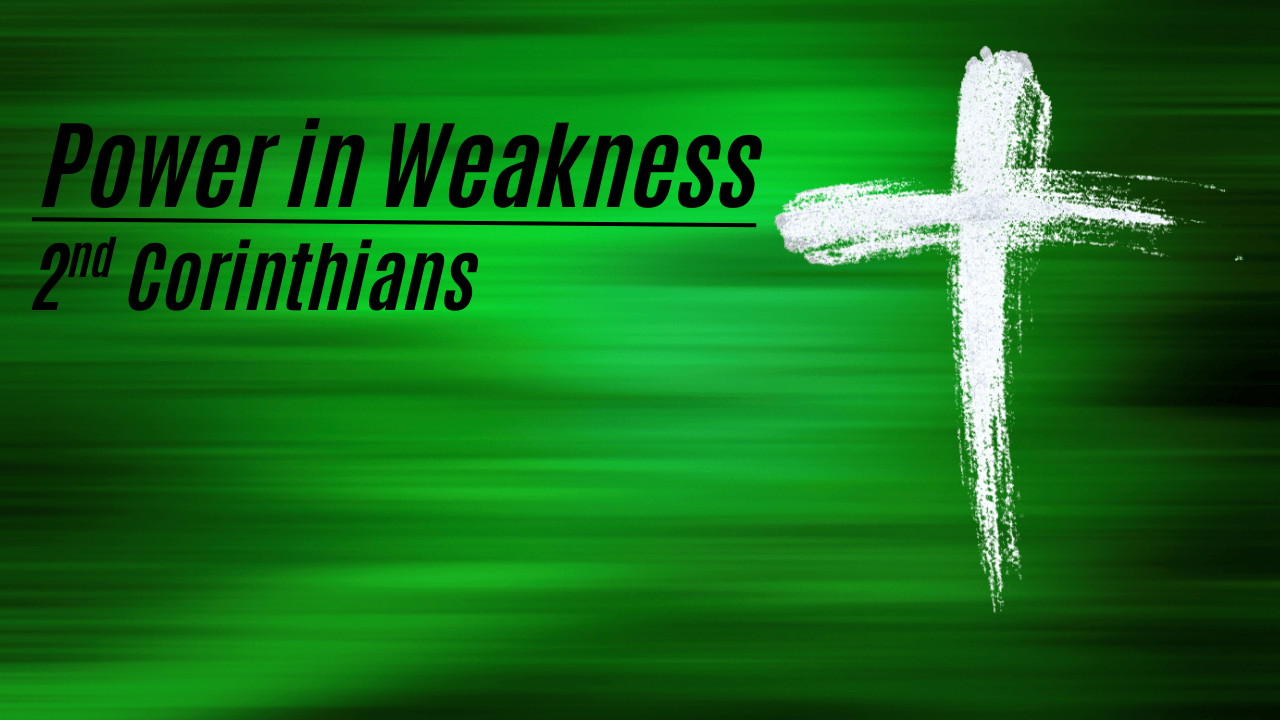
Second Corinthians is Paul’s defense of his love for and love toward the church in Corinth. Paul’s defends his apostolic ministry against critics who question his authority. He recounts profound suffering—beatings, imprisonment, near-death experiences—yet refuses to boast except in his weaknesses. Through personal vulnerability, Paul reveals Christ's power working most effectively in human frailty. He describes his mysterious "thorn in the flesh," where God's response becomes the letter's centerpiece: "My grace is sufficient for you, for my power is made perfect in weakness." Paul embraces this paradox, demonstrating that divine strength flows through broken vessels. His authenticity and struggles validate rather than undermine his ministry, proving that God's power shines brightest through human limitation and dependence.

